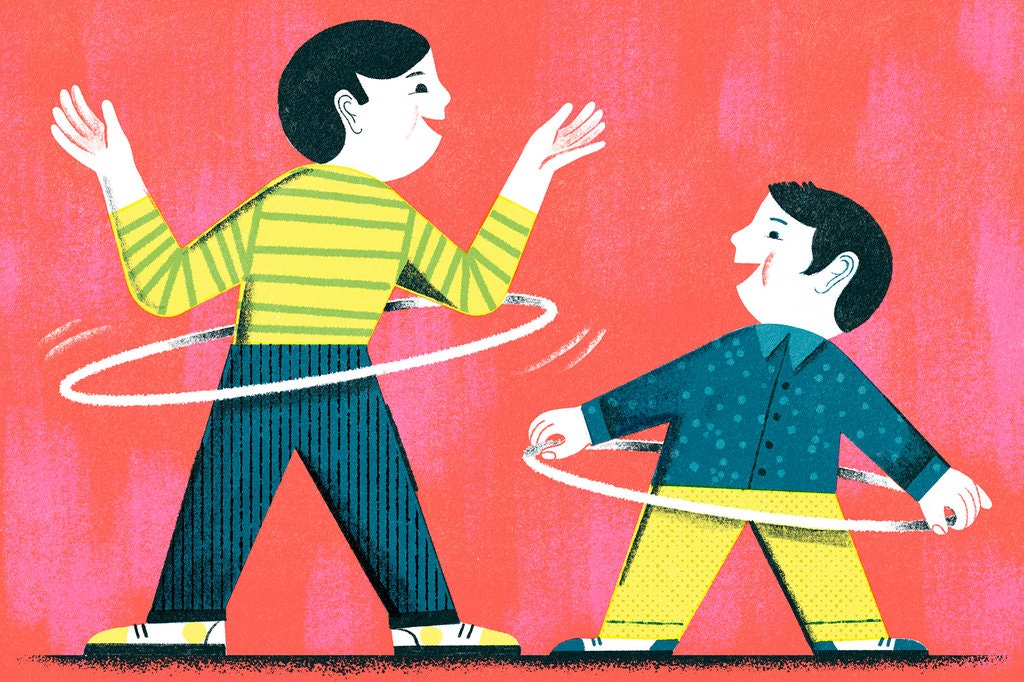GROWING UP ALONGSIDE A SIBLING WITH A DISABILITY
When children help with the education of a brother or sister with special needs, the outcomes are often good for both.
By Keren Landman

Not long after my mother learned that my brother, David, was autistic, she began what she called “little school”: sessions in which she taught him to draw faces, cut with scissors, read and cook. He was 4, I was 2. I recently asked her how she balanced David’s needs with mine. “You were the teacher’s assistant,” she said. “I was trying to make you feel important.”
It was the 1970s, and researchers considered siblings of children with disabilities as a sort of disadvantaged population. Since then, a body of research suggests that when children help with the education of a brother or sister with a disability, the outcomes are often good for both — and my mom was way ahead of the curve. She believed she could help David and lift me up, too. There wasn’t a lot of guidance at the time, so Mom hired an education specialist and talked to David’s teachers and school psychologist.
More recently, researchers have viewed families with special-needs children through a more positive, less stigmatizing lens, said Meghan Burke, Ph.D., an associate professor of special education at the University of Illinois at Urbana-Champaign. This modern framework acknowledges the strengths children may gain from having a sibling with a disability, including enhanced adaptability, empathy and tolerance, said Burke.
However, several studies have suggested these siblings also have higher rates of anxiety, depression and difficulty with peers. Low income families are especially vulnerable because they have less access to resources.
What is clear, Dr. Burke said, is that siblings of children with special needs have needs, too — and parents can do a lot to meet those needs with the help of a few strategies and resources.
Share information
“The first thing is to recognize that the sibling experience parallels the parents’ experience,” said Emily Holl, director of the Sibling Support Project, a national program that works with siblings of people with disabilities. Like adults, children desperately want information about their siblings’ health, but they’re often excluded from the conversations parents have with doctors, social workers and therapists.
“A child’s imagination is much wilder, often, than reality,” said Avidan Milevsky, Ph. D., a psychotherapist and associate professor of psychology at Ariel University in the occupied West Bank. In the absence of accurate information, “that child, in their mind, is creating these horrific explanations for why their brother’s in the hospital, or why Mom is crying when the doctor calls.” Children may also imagine disability to be contagious, Holl said. “If you can catch your brother’s strep throat, why wouldn’t you be able to catch spina bifida?”
Holl recommends a proactive approach to informing siblings about a diagnosis. Find age-appropriate books that explain the condition and include siblings in visits with health care providers.
Good examples and equal expectations
According to Dr. Milevsky, siblings of children with special needs often grow up quickly and feel a sense of responsibility for their siblings in a phenomenon often called parentification. This might seem like a positive outcome for parents — a good kid is one who takes some of the burden off her parents. But too much parentification can lead to behavioral problems and feelings of rejection.
As young adults, siblings may struggle to understand how much caretaking is normal in a relationship or a marriage after taking on so much caregiving as children. My own parentification most likely fostered my disinterest in having children. I’ll never forget cleaning up the bloody shards of glass my brother left after breaking a bathroom window with his face during a tantrum. Today my eyelid twitches when I imagine caring for anything with more needs than a goldfish.
Most experts agree you should encourage your kid to be a kid as long as possible. Some young children worry about where their siblings will live and who will care for them in adulthood. Parents should create opportunities to talk about the future and to assure their children that they are making plans.

In Holl’s practice, she’s noticed that some children experienced less resentment toward special-needs siblings. She said their families did two things. First, they set equal expectations of all siblings as best they can — with respect to behavior and chores, for example. And second, they have a family life that revolves around something other than the disability, whether it’s a shared activity like camping or music, or an organization or faith community in which the whole family can participate.
The single strongest factor affecting a sibling’s interpretation of the disability is the parent’s interpretation of the disability, Holl said. Approach your child’s disability with humor and grace, as something you’ll all work through together, and the other children at home will have a more positive outlook.
Make time for the sibling to connect with parents and peers
“Isolation is one of the major issues that siblings face,” Holl said. Studies of siblings of children with autism and intellectual disabilities have pointed to a pattern of loneliness, peer problems and depression in children as young as 5.
I don’t remember much of my 5th birthday party, but my mother says it was the first time I was aware of other kids noticing my brother’s disability. After that, she said, I didn’t have many friends over.
It’s important for siblings to know that they’re not alone, Holl said. Her organization administers Sibshops, peer support groups that use play-based activities to help siblings of children with disabilities. Participants tend to be between 8 and 13, although some are as young as 6. While Sibshops may be therapeutic, they’re not therapy: “We are unapologetically playful,” Holl said.
It can also be profoundly nourishing for siblings to have short intervals of one-on-one time with their parents. “Leave room to talk about anything or nothing,” Holl said, including the child’s questions about her sibling or her own concerns. Keep the communication style open and use active listening so children feel heard. Let the moment be casual and unplanned. A car ride to soccer practice is long enough for meaningful together time; my mother set aside a few minutes at bedtime for a back rub and chitchat.
This unscheduled time allowed me to express feelings that were hard for my mom to hear, but that actually signified and helped cement healthy emotional connections. And it provided a starting point for problem-solving. My mother remembers a school psychologist telling her she was lucky when she heard I was grumbling that David got more attention than me. Complaining was far better than keeping my feelings bottled up.
And those grumbles opened the door to a path forward. “I remember that it hurt me,” said my mom. But “I wanted to do something about it.”
I never really developed a close bond with David and, in some ways, his existence felt like an intrusion into my young life. But my mom showed me what it meant to care for him. Today I’ve made a life that allows me to be there for him, and I’m prepared to make my own sacrifices for his well-being. If not for him, then for her.



